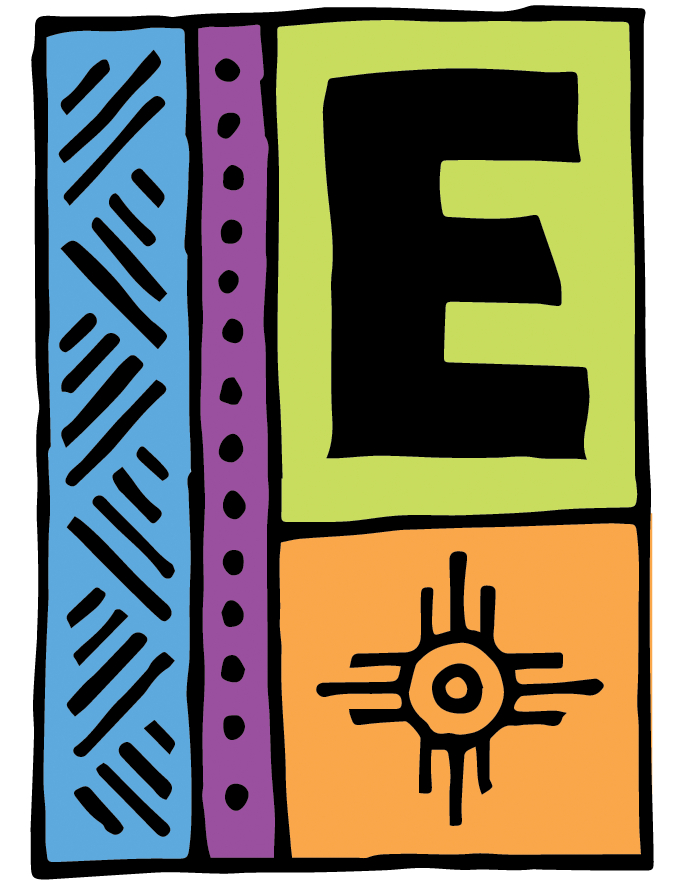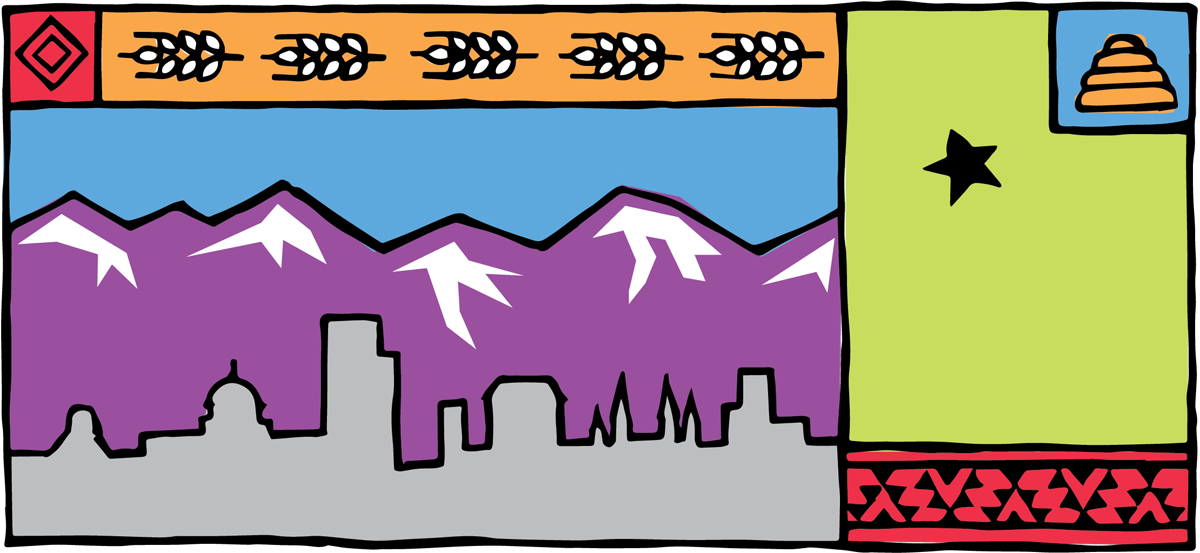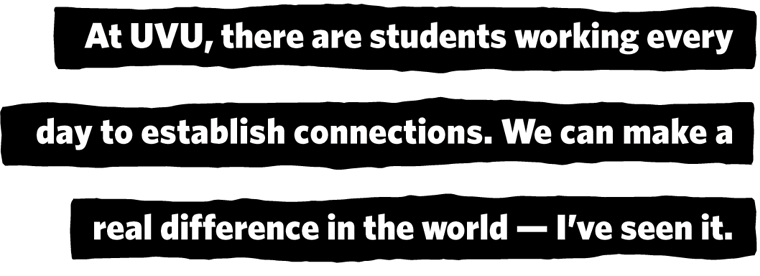
Education is fundamentally concerned with the future — preparing young people to lead and succeed. But too often in politics and global affairs, young adults don’t get a say in the policies and programs that directly affect the world they will inherit.
By Layton Shumway | Photography by

preparing young people to lead and succeed. But too often in politics and global affairs, young adults don’t get a say in the policies and programs that directly affect the world they will inherit.
Baldomero Lago, Utah Valley University’s chief international officer, knows that well. In addition to his 30 years of educational experience, he has served his native country of Spain as honorary consul since 1999 — service which earned him a knighthood. And all that experience, much of it teaching young people, has taught him how important it is to provide opportunities for students to become globally aware. And to be heard.
“It's critical that youth at a very early stage have a venue to express their voices and to bring a conversation to the table, so the rest of us can actually listen and make some decisions based on their say,” Lago says. “I think it is critical that we engage with them.”
This year, UVU students got an unprecedented chance to participate in global affairs. Thanks to the efforts of Lago and others at UVU, along with the cooperation and partnership of leaders throughout Utah, the 68th annual United Nations Civil Society Conference was held in Salt Lake City — the first time the conference has been held anywhere in the United States other than New York City. And the conference’s topic, “Building Inclusive and Sustainable Cities and Communities,” not only fits perfectly with UVU’s mission, but it also might be the most important subject for young people.
“This conference is historic because it’s an opportunity for the public to voice their opinion to the United Nations,” says UVU student John McIlmoil, who worked with the conference’s outreach committee to contact other universities. “The U.N. is really wanting youth participation because we are the future leaders of the world.”
UVU’s Office for Global Engagement, led by Lago, facilitates international engaged learning experiences such as study abroad and exchange programs, internships, diplomacy, and intercultural events. Diplomats from foreign countries often visit UVU to give lectures and meet with students, from countries as diverse as Russia, Austria, Peru, Azerbaijan, Tajikistan, and Spain in the last year alone.
Lago credits his predecessor in the Office for Global Engagement, Rusty Butler, with laying the foundation for this work, in addition to making connections with the United Nations. “We have had a great culture at UVSC and now UVU of hosting dignitaries,” Lago says.
In addition, Lago says, many UVU programs align with the aims of the United Nations, especially in its Sustainable Development Agenda. For example, UVU is home to the Utah International Mountain Forum, a coalition of student clubs on campus that promotes the sustainability of the world’s mountain environments and livelihoods through youth efforts. In December 2017, UVU was granted affiliate membership status by the U.N. Department of Public Information — the only university in Utah so affiliated. And in March 2019, a delegation of nearly 50 UVU students traveled to New York City to address the United Nations.

“We have all these different entities on campus that, in essence, whenever you talk to any of them, you realize they align with the mission of the United Nations,” Lago says.
With the relationship between UVU and the United Nations in place, a rare opportunity presented itself. For its annual Civil Society Conference, the U.N. usually alternates between hosting in New York City and in a nation outside the United States, every other year. Due to unforeseen circumstances, plans to host the conference in a foreign nation fell through, and the U.N. began searching for a different global location to host the conference. Lago, together with U.N. Department of Public Information member Felipe Queipo, surprised the U.N. by inquiring whether Utah could be a venue.
“At first, they wondered, ‘Why Salt Lake City of all places?’” Lago says. “But I believe the humanitarian work that we do in this state, the spirit of volunteerism, the global component that we have, made us very unique in comparison to other states in the United States. I think that we had a pretty good ticket.”
But they needed a local partner. Governments cannot convene U.N. conferences, only recognized nongovernmental organizations can. Fortunately, due to UVU’s 2017 recognition, the university qualified as a convener. They just needed an ally in a local city to act as host. Lago found one in Salt Lake City Mayor Jackie Biskupski.
“Given Salt Lake City’s mission of building a sustainable and resilient city, it made perfect sense to approach the city to help make this dream a reality,” Lago says.
In a press release, Biskupski said, “I can think of no better time and no better place than Salt Lake City for the United Nations and the world’s NGOs to expand awareness in this country of sustainable development goals and the value of global unity.”
With more than 8,000 individuals registered to attend from more than 138 nations, the U.N. Civil Society Conference brought a global audience to the very doorstep of UVU students. And many took advantage.
UVU student Michael Hinatsu, vice president of UVU’s Utah International Mountain Forum, presented on UIMF’s successful advocacy work on sustainable development and how UVU’s engaged-learning model can benefit learners throughout the world. He emphasized the value of that experience for himself and other students.
Another UVU student, Sam Elzinga, served on the conference’s Youth Subcommittee, which published its own declaration alongside the Civil Society’s main outcome document.
“We are the future of the world,” Elzinga says. “Therefore, we have the most to gain from participating in these discussions. Conversely, we have the most to lose if we shirk our responsibility to address these international issues.”
“If we really care to make any real change, we need to get involved,” UVU student and presenter William Gum says. “Not involving young people in discussions on international issues that affect all of us excludes the voices of those who often have fresh, new perspectives on tackling global issues. We care just as much as the older global policymakers.”

UVU President Astrid S. Tuminez spoke during the plenary session and moderated a panel at the conference. “I’m proud of the students from UVU and other Utah schools who have worked with the U.N. to bring the conference to our region, helping to create an opportunity for Utah’s leaders, educators, and young people to collaborate with global NGOs and build a sustainable future for everyone,” President Tuminez says.
“Students and youth are vital to continue the process of dialogue, advocacy, and impact,” Gum says. “At UVU, there are students working every day to establish connections. We can make a real difference in the world — I’ve seen it.” ◼